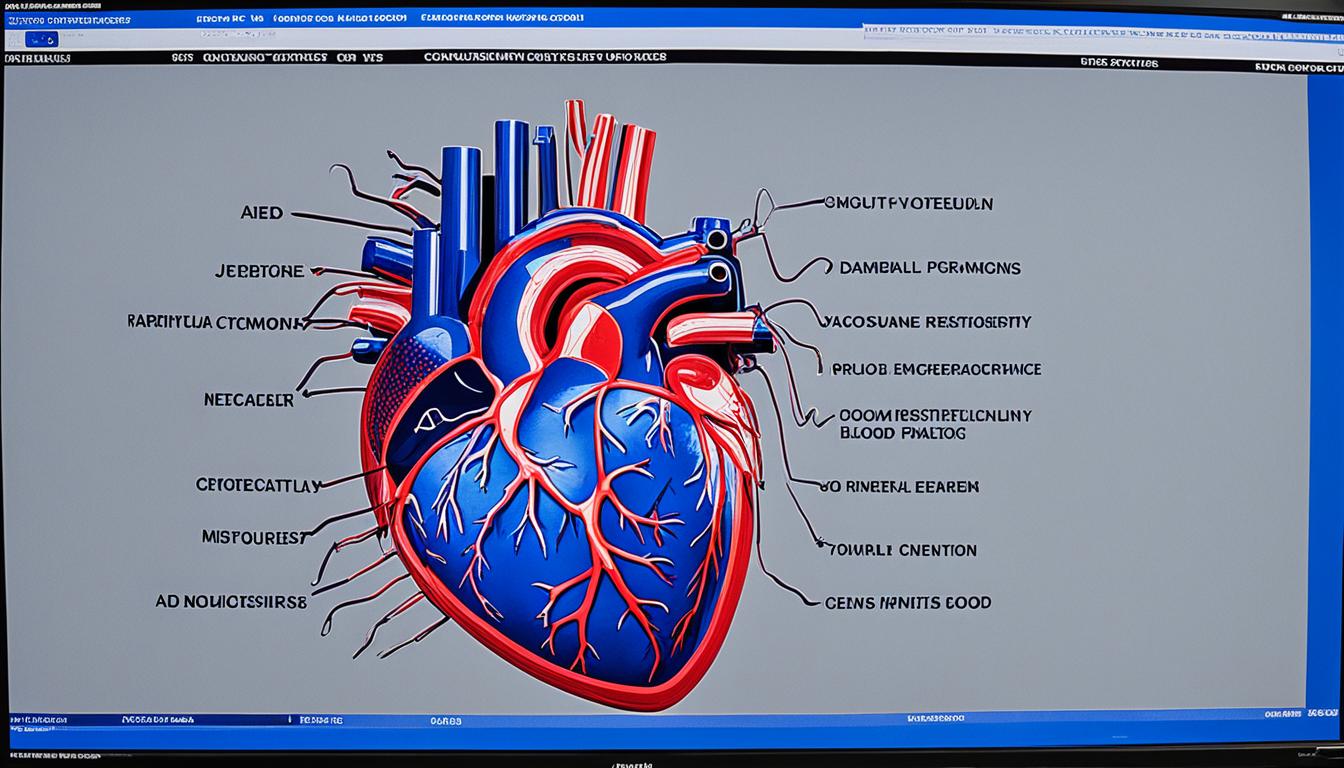Cardiogenic shock is a serious and severe condition. It happens when the heart can’t pump enough blood. This causes organs not to get enough oxygen. The main reason is often a heart attack, which harms the heart’s ability to pump well. Symptoms include fast breathing, feeling short of breath, quick heart rate, confusion, passing out, sweating a lot, looking pale, and having cold hands and feet. People in this condition might also not pee much.
A heart attack, also known as a myocardial infarction, is the main cause. It can damage a big part of the heart muscle. Other reasons include heart valve infections, or damage to the right side of the heart, inflammation of the heart muscle, and taking too many drugs. To try to avoid getting this condition, it’s recommended you control blood pressure, lower cholesterol and fats in your diet, stop smoking, stay at a healthy weight, and stay active.
Key Takeaways:
- Cardiogenic shock is a serious condition characterized by inadequate cardiac output and low organ oxygen levels.
- The most common symptoms are fast breathing, feeling very short of breath, a quick heart rate, and feeling confused.
- Heart attacks are the top cause of cardiogenic shock.
- Other causes include harm to the heart’s right side, heart muscle inflammation, heart valve infections, and too much drug use.
- To avoid this condition, it’s important to manage health risks like high blood pressure, high cholesterol, and smoking.
Diagnosis of Cardiogenic Shock
Diagnosing cardiogenic shock is done by clinical examination and looking at specific factors. Doctors check for certain substances in the blood and see how the person is reacting physically.
Clinical Criteria
- Biomarkers
- Hemodynamic Criteria
- Biomarkers are key in finding cardiogenic shock. They show how bad it is and help tell it apart from other shocks. Things like urine amount and blood lactate are often looked at to see if the heart is working normally.
- Hemodynamic criteria look at the flow of blood through the body. Doctors see if the heart is not working right by checking the patient’s blood pressure and if the body is getting the blood it needs.
Besides looking at the patient, doctors also use certain blood tests to confirm cardiogenic shock. These tests show if the body is not working well, like if the kidneys or liver are not doing their job right.
It’s important to know how cardiogenic shock works to understand these blood tests. Knowing this helps find the right tests and treat the condition better.
| Biomarker Criteria | Elevated Levels Indicate |
|---|---|
| Metabolic Acidosis | Impaired tissue perfusion and inadequate oxygen delivery |
| Elevated Serum Lactate | Decreased cardiac output and impaired tissue oxygenation |
| Elevated Serum Creatinine | Renal dysfunction due to reduced perfusion |
| Increased Liver Function Tests | Hepatic congestion and impaired hepatic function |
Causes and Pathophysiology of Cardiogenic Shock
Cardiogenic shock is a critical situation. It happens when the heart can’t pump enough blood. This stops the body from getting the blood it needs. The main cause is an acute myocardial infarction. It is where plaque blocks arteries. This blockage comes from a condition called atherosclerosis. This stops the heart from getting enough oxygen in the blood.
An acute myocardial infarction can kill parts of the heart muscle. This makes the heart work less effectively. Reduced pumping of the heart can cause cardiogenic shock. Also, if the right side of the heart isn’t working well, it can’t send blood to the lungs for oxygen. This also can lead to the shock.
Myocarditis and endocarditis can also lead to this condition. Myocarditis is when the heart muscle gets inflamed. Endocarditis is an infection of the heart valves. Both can disrupt the heart’s normal work. They make cardiogenic shock worse.
Some drugs or poisons can also cause this problem. Drugs like opioids or stimulants are very harmful to the heart. They make the heart muscle not work well. So, it can’t pump blood around the body right.
Causes and Risk Factors Overview:
- Acute myocardial infarction
- Plaque buildup and atherosclerosis
- Right ventricular dysfunction
- Myocarditis
- Endocarditis
- Drug overdose or poisoning
It’s very important to understand this condition’s causes. This helps doctors diagnose and treat it early. By knowing what leads to cardiogenic shock, doctors can help their patients better. They can make their recovery chances higher.
Stem Cell Therapy in Managing Cardiogenic Shock
Stem cell therapy is showing promise in treating cardiogenic shock, a severe heart condition. Studies indicate that these cells can boost heart function and help repair heart tissue. This gives new hope for people with this dangerous condition.
Both lab and clinic trials have found benefits from using stem cells like mesenchymal and cardiac progenitor cells. These methods show great potential in making the situation better for those with cardiogenic shock. They work by fixing the heart’s harm and improving how it works.
But, more research and tests are needed to confirm how effective and safe stem cell therapy is. More studies aim to show what stem cells can really do and how to use them better. If progress continues, stem cell therapy might play a crucial role in treating cardiogenic shock.

